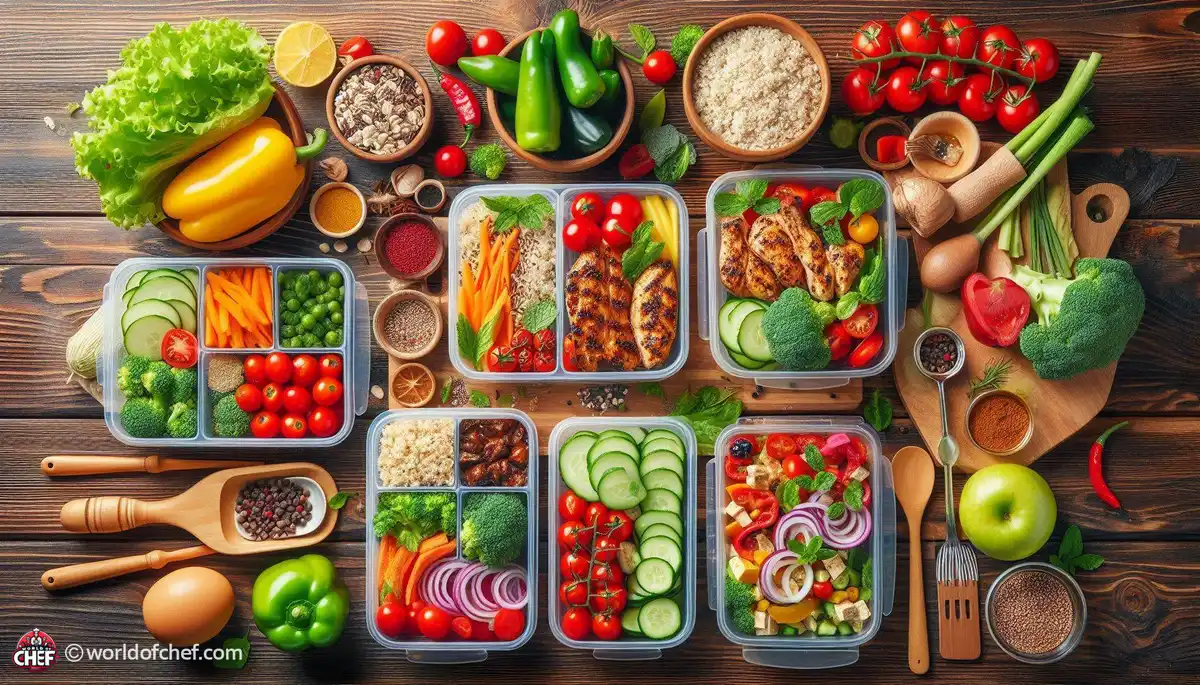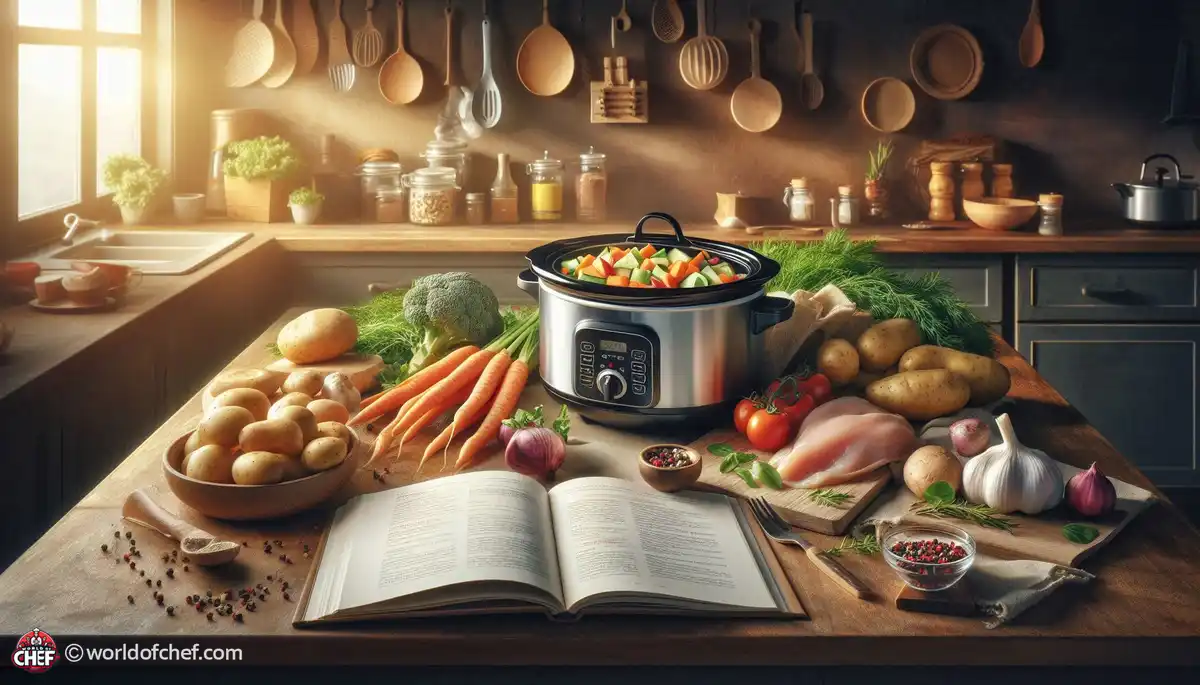
Understanding Different Cooking Oils: A Beginners Guide
Alan Slayton - Oct 29, 2024 - 15 min read


Meal planning can seem overwhelming, especially for those just starting out. With busy schedules and endless commitments, it’s easy to fall into the trap of takeout and processed foods. However, taking the time to plan meals can save you money, reduce stress, and promote healthier eating habits. This guide will provide you with simple meal planning tips that are perfect for beginners, helping you navigate the kitchen with confidence.
Meal planning is the process of planning your meals for a specific period, usually a week or a month. It involves deciding what you’ll eat, preparing shopping lists, and sometimes even pre-cooking meals. The main goal is to create a structured approach to your meals that aligns with your dietary needs and lifestyle. By planning ahead, you can ensure that you have all the ingredients you need and can avoid last-minute unhealthy choices.
For beginners, meal planning may feel like a daunting task, but it doesn’t have to be complicated. Start with a simple framework. Decide how many meals you need to plan for—this could include breakfast, lunch, dinner, and snacks. You can also consider Dietary Preferences and restrictions when selecting meals. With just a bit of thought, meal planning can become a manageable and enjoyable task.
The beauty of meal planning is its flexibility. You can plan around what you have on hand or what’s on sale at your local grocery store. This not only helps with budgeting but also encourages creativity in the kitchen. With some practice, you’ll find that planning your meals becomes second nature.
The benefits of meal planning are numerous, especially for those with busy lifestyles. First and foremost, it saves time. By dedicating a few hours each week to planning and prepping, you can avoid those frantic evenings when you realize you have no idea what to make for dinner. With a clear plan, you can spend less time thinking about meals and more time enjoying them.
Another significant benefit is cost savings. When you plan your meals, you create a shopping list that helps you avoid impulse purchases. You’re more likely to buy only what you need, which can lead to less food waste. Plus, when you’re aware of what meals you’ll be making, you can take advantage of sales and discounts on ingredients, further reducing your grocery bill.
Meal planning also promotes healthier eating habits. By preparing meals in advance, you have more control over what you eat. You can choose whole foods, incorporate more fruits and vegetables, and avoid the temptation of fast food. This not only benefits your physical health but can also improve your mental well-being, as you feel more organized and in control of your diet.
There are various meal planning styles, and finding the one that suits you best is crucial. Some people prefer to plan every meal, while others might only plan dinners or specific meals for the week. You might also consider batch cooking, where you prepare large quantities of food at once and portion them out for later. This method is particularly useful for those with hectic schedules, as it allows you to have ready-made meals waiting for you.
Another option is theme-based meal planning. This involves assigning different themes to each day of the week, such as Meatless Monday or Taco Tuesday. This approach can make planning more fun and give you a structure to work with. You can also incorporate seasonal ingredients based on what’s fresh and available, making your meals more flavorful and nutritious.
Lastly, digital tools can assist in your meal planning journey. There are numerous apps and websites designed to help you create meal plans, generate shopping lists, and even find recipes based on the ingredients you have at home. Utilizing technology can simplify the process and make it more enjoyable.
Before you dive into meal planning, it’s essential to take stock of your kitchen and pantry. Start by checking what ingredients you already have. Look for staples like grains, canned goods, frozen items, and spices. This will help you avoid duplicate purchases and inspire your meal choices. For instance, if you have a can of chickpeas and some rice, you might plan a delicious curry or a grain bowl.
Next, consider the tools and appliances you have available. Do you have a slow cooker, an Instant Pot, or a blender? Knowing what you can work with can influence your meal choices. If you have a slow cooker, you might plan meals that require minimal preparation and can be left to cook while you’re busy with other tasks.
Finally, it’s important to think about storage. Proper storage solutions will help keep your ingredients fresh and make it easier to access what you need when you’re ready to cook. Organizing your pantry and refrigerator can streamline the cooking process and reduce food waste.
Choosing recipes is one of the most enjoyable parts of meal planning. Start by selecting a few go-to recipes that you know you love and can prepare easily. These can serve as a foundation for your weekly meal plan. You can also explore new recipes to keep things interesting. Websites, cookbooks, and Social Media platforms are great sources for inspiration.
When selecting recipes, consider balancing your meals. Aim for a variety of proteins, whole grains, and colorful vegetables to ensure you’re getting a range of nutrients. Also, think about how recipes can be repurposed throughout the week. For example, if you make roasted chicken for dinner, you can use the leftovers in salads or wraps the next day.
Don’t forget to involve your family or roommates in the process. Asking for input can make meal planning more collaborative and ensure everyone is excited about the meals you’ll be preparing. You can even create a family favorite list, making it easy to select recipes for future meal plans.
Once you have your recipes, it’s time to create a grocery list. Start by listing all the ingredients needed for the recipes you’ve chosen. Group similar items together, like fruits and vegetables, proteins, and pantry staples, to make your shopping trip more efficient. This will help you stay organized and avoid wandering aimlessly through the aisles.
As you build your list, keep an eye out for ingredients that you can buy in bulk or on sale. This not only saves you money but can also help reduce the frequency of your grocery trips. Many items, like grains and canned goods, have a long shelf life, making them great candidates for bulk purchases.
Finally, check your kitchen for any items you might already have that can be used in your planned meals. Cross-checking your pantry against your grocery list can help prevent waste and save you from buying duplicates.
Meal prepping is an essential aspect of meal planning that can save you time during the week. Once you’ve gathered your groceries, set aside a few hours to prep your meals. Start by washing and chopping vegetables, marinating proteins, and cooking grains. This way, everything is ready to go when it’s time to cook.
You can also consider preparing entire meals in advance. For example, you could make a large batch of soup or a casserole that can be portioned out and stored in the fridge or freezer. These ready-to-eat meals can be a lifesaver on busy days when you don’t have time to cook from scratch.
Investing in good-quality storage containers can make meal prepping easier. Look for stackable containers that can be labeled and are microwave-safe. This not only keeps your meals organized but also allows for easy reheating. Having your meals prepped and stored will help you resist the temptation of unhealthy takeout options.
Freezing meals can be a fantastic way to ensure you always have something healthy on hand. When preparing your meal plan, consider incorporating freezer-friendly recipes that can be made in larger quantities and stored for later. Soups, stews, casseroles, and cooked grains are great options that freeze well.
When freezing meals, be sure to use airtight containers or freezer bags to prevent freezer burn. Label each container with the name of the dish and the date it was made, so you can easily keep track of what you have on hand. This makes it simple to pull out a meal for lunch or dinner without having to think twice.
Defrosting can also be planned into your meal prep routine. For instance, if you know you’ll need a meal on a busy night, you can move it from the freezer to the fridge the night before to allow it to thaw. This foresight will help you stick to your meal plan and make eating healthy a breeze.
Life can be unpredictable, and your meal plan should be able to adapt accordingly. It’s essential to remain flexible and allow for changes as they arise. If you have a last-minute social event or unexpected schedule shift, don’t stress—just adjust your meal plan. Consider moving meals around or substituting ingredients with what you have on hand.
Another way to stay flexible is by planning a few easy “emergency” meals that can be prepared quickly. These might include a simple stir-fry, pasta with jarred sauce, or a hearty salad. Having these meals in your back pocket can relieve some pressure and help you stay on track even when life gets busy.
Listening to your body is also crucial. If you find yourself craving something different than what you planned, don’t hesitate to switch it up. The goal of meal planning is to make your life easier and more enjoyable, so it’s okay to adapt based on what you feel like eating.
Meal planning doesn’t have to feel like a chore. To keep it enjoyable, incorporate variety into your meals and be open to trying new things. Explore different cuisines, experiment with seasonal ingredients, or challenge yourself with a new cooking technique. The more you enjoy the process, the more likely you are to stick with it.
Consider making meal planning a social activity. Invite friends or family to join you in planning and prepping meals together. This can turn a solitary task into a fun gathering, where everyone contributes their ideas and skills. Plus, you’ll have the added benefit of sharing delicious food!
Lastly, take time to celebrate your successes, no matter how small. Whether it’s mastering a new recipe or successfully sticking to your meal plan for the week, acknowledging your achievements can keep you motivated and excited about meal planning.
Embarking on a meal planning journey may feel challenging at first, but with these simple tips, you’ll find it can be a rewarding experience. Start small, build your confidence, and remember that flexibility is key. As you continue to practice meal planning, you’ll become more efficient and may even find a newfound joy in cooking.
Meal planning not only supports healthier eating habits but also empowers you to take control of your food choices. With a bit of creativity and organization, you can navigate the kitchen like a pro and make mealtimes enjoyable for yourself and your loved ones. Embrace the journey, and watch as meal planning transforms your busy lifestyle into one filled with delicious, home-cooked meals.

Alan Slayton - Oct 29, 2024 - 15 min read

Kennedy Spellman - Oct 28, 2024 - 26 min read

Jacob Nesmith - Oct 28, 2024 - 13 min read

Stanley Kingston - Oct 27, 2024 - 19 min read